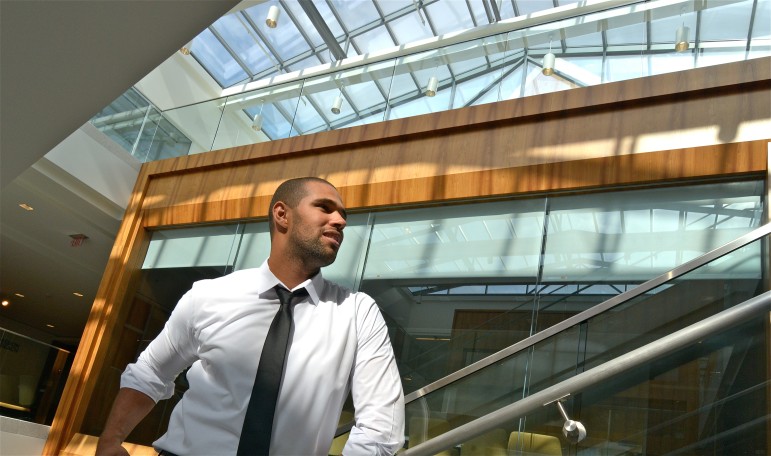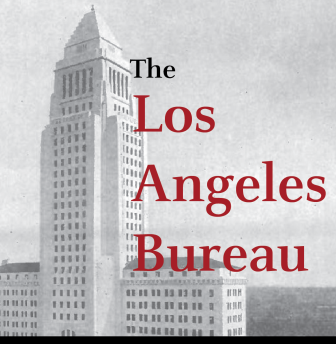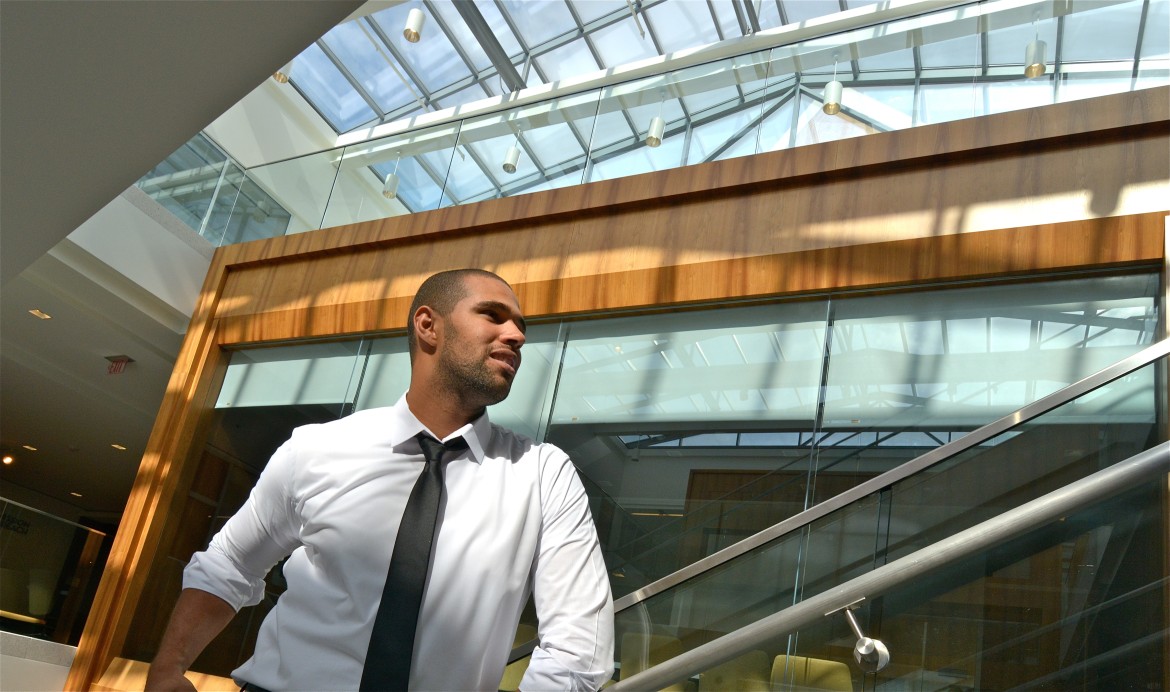
Mark Lawson Shepard / JJIE
Prophet Walker
LOS ANGELES -- When he was a teenager growing up on the mean streets of South Central Los Angeles, Prophet Walker hardly seemed destined for success.
His mother was a heroin addict, and his neighborhood was filled with racial strife between blacks and Hispanics. Walker, the son of a white mother and black father, got into fights often, believing that physical violence was the key to his survival. One day while ditching school, Walker and his friends got into a fight with a group of Hispanic teenagers. Walker fractured another boy’s jaw, and was arrested. Then 16, he was tried as an adult and convicted of assault causing great bodily harm. He was sentenced to six years in prison.
 But this is a story of hope and redemption, not despair, one that links the disparate worlds of Los Angeles’ ghetto neighborhoods with the glamour of Hollywood. It is the story of how Walker, with the help of movie producer Scott Budnick (“The Hangover”) and his own fierce determination, overcame his difficult circumstances and transformed his life into a success story.
But this is a story of hope and redemption, not despair, one that links the disparate worlds of Los Angeles’ ghetto neighborhoods with the glamour of Hollywood. It is the story of how Walker, with the help of movie producer Scott Budnick (“The Hangover”) and his own fierce determination, overcame his difficult circumstances and transformed his life into a success story.
“Prophet is truly an extraordinary person,” says Carol Oughton Biondi, a commissioner of the Los Angeles County Commission for Children and Families and a director of the Washington, D.C.-based Children’s Defense Fund. “He will excel at anything he wants to do. He is the real, real deal.”

Mark Lawson Shepard / JJIE
Prophet Walker at work. Mark Lawson Shepard / JJIE
Walker’s transformation began while still in prison. With Budnick as his mentor, he participated in a program called InsideOUT Writers, which uses creative writing to help currently and formerly jailed young adults transform their lives. He earned his high school degree while behind bars, but that was only the beginning.
He helped devise a Youthful Offender Pilot Program to allow juvenile offenders to pursue an education in safer settings, such as medium-security prison, rather than being thrown in high-security prisons that offered few opportunities. Budnick helped persuade state prison officials to adopt the pilot program, which has since been expanded.
After being released from prison, Walker graduated from Loyola Marymount University with a degree in engineering, helped design an innovative robotic garage in Santa Monica and became a project manager for Morley Builders, a prominent southern California construction company. And today Walker, now 26 years old and the father of an 8-year-old daughter, is running for the California state Assembly from the 64th district, which represents Carson, Compton, Watts, Wilmington and North Long Beach.
“I’m hugely impressed with his desire to give back” to his community, says Anne Devereux-Mills, an advocate for improving children’s health and a key member of the team that helped pass Proposition 36, which reformed California’s “Three Strikes Law” for non-violent felony convictions. “He is unique in his ability to rise above his circumstances and become a role model for youth.”
Todd Rubenstein, a Los Angeles attorney and chairman of InsideOUT Writers, agrees. “What Prophet represents is that if you put your mind to something and work hard, you can achieve anything. You are not defined by the worst thing you’ve ever done.”
Walker, an articulate, energetic and charismatic man, recently discussed his journey of redemption, the people who influenced him and his goals for the future in a lengthy interview with JJIE.
Like many others, Walker was unprepared when he was thrust into an overworked and flawed justice system after he was arrested for assault at 16 and tried as an adult.
“What I thought was going to be an unfortunate fight, an unfortunate reality of urban living, turned out to be me being picked up for assault,” Walker says. “I went to court and tried fighting the case and was tried as an adult.
“I had a young lawyer who was not very well prepared for the case,” Walker says. “I got a six-year sentence and had no record before that. The judge in fact thought that it was too harsh and did not want to sentence me, but his hands were tied by the mandatory sentencing.” He adds, “I hadn’t been to college yet and didn’t know that there was a theory called ‘prisoner’s dilemma’ that said if you just shut up you have a better chance of never being incarcerated.”

Mark Lawson Shepard / JJIE
Prophet Walker. Mark Lawson Shepard / JJIE
While in juvenile hall, Walker met Budnick, the Hollywood producer who would have a major impact in helping Walker turn his life around. Budnick, the president of Green Hat Films, which produced the hit movie “The Hangover,” was working with young inmates in a program called InsideOUT Writers. The program uses creative writing as a catalyst to empower young inmates and help them transform their lives.
“He was a great teacher, and when I say teacher I mean facilitating conversation about your goals, your personal beliefs and your sorrows,” Walker says. He remembers one conversation with Budnick as particularly important.
“I remember talking to him one day crying,” Walker says. “I was saying ‘I shouldn’t be here. I should be doing something else and this was not my life.’ Scott’s famous words were, ‘Stop crying and do something about it.’”
Walker says that he was also influenced by the guards in juvenile hall.
Walker had passed his GED, or high school equivalency test, but he hadn’t gotten his certificate yet. When he asked one of the guards about this, the guard gave him some advice that stuck with him. “He told me that, ‘You don’t speak loud enough, that’s why you don’t have your paper.’ I said I have an innately soft way of speaking. He said, ‘It’s not talking loud; it is standing up for yourself. When people have a job you need to make sure that they do those jobs. Likewise, you make sure that you do your job throughout life.’”
When he was 18, Walker was transferred from juvenile hall to Ironwood State Prison, an adult facility in Blythe, Calif. He says he was terrified, but he was able to find a college program to continue his education. And once again, he got help from someone who believed in him: his grandfather, Richard Jones, who sent him books, including the works of Socrates and “The Kite Runner,” by Khaled Hosseini.
After two years at Ironwood, Walker persuaded prison officials to transfer him to the California Rehabilitation Center in Norco, Calif., a lower-security facility with an education program. “I was stoked,” Walker says. “I had just visited hell for the last few years of my life. This prison was Disneyland; that’s what it felt like. We were able to talk to other races and they had typewriters,” Walker says.
When Budnick came to visit him at Norco, Walker said, “Any kid who gets tried and sentenced as an adult should come to his place. They should never have to deal with the madness that I had to deal with on higher levels.” Budnick told Walker to come up with a plan and that he would take it to prison officials if it was good enough.
Walker put together a proposal that revised the scoring system used by state corrections officials so that it enabled young prisoners with good behavior to be sent to lower-security facilities, according to an account on the website of Los Angeles County Supervisor Zev Yaroslavsky. Budnick took the proposal to state prison officials in Sacramento, who embraced the idea and put it into effect.
By this time, Walker had decided he wanted to become an engineer, and he was determined to get into Loyola Marymount University, calling the school’s admissions office repeatedly whenever he was allowed to make a phone call.
“I remember talking to an admissions director saying I need help,” Walker says. “Other kids are coming out of high school with a 4.0 GPA and a slew of community service. I’m coming out with a 3.8 GPA and a prison record. I remember her believing in me.” He applied and was accepted.
In his quest for the state Assembly, Walker has been embraced by a combination of Hollywood figures and advocates for juvenile justice. In October, Carol and Frank Biondi held a fundraiser for Prophet’s campaign at their home in Brentwood, an affluent neighborhood on the Westside of Los Angeles. Frank Biondi is a former chief executive of Viacom Inc., the New York media company, and Universal, the Los Angeles movie studio.
The hosts also included Budnick and Rubenstein; Lucy Firestone, an entrepreneur and producer whose great-grandfather founded Firestone Tire & Rubber Company; Nancy Ozeas, director of programs at the Milken Institute and a longtime supporter of humanitarian causes; and Javier Stauring, co-director of the Office of Restorative Justice of the Archdiocese of Los Angeles.

Mark Lawson Shepard / JJIE
Prophet Walker. Mark Lawson Shepard / JJIE
Despite some influential backers, Walker’s election prospects are uncertain. He is facing formidable competition in the race to succeed Assemblyman Isadore Hall, III. Hall, first elected to the California state Assembly in November 2008, cannot run for re-election under term-limit restrictions, approved in 1990, which limited California lawmakers to three terms in the state Assembly and two terms in the state Senate. (In 2012, California voters approved Proposition 28, which allows state legislators to serve a total of 12 years either in the state Assembly, state Senate or a combination of both. The new rules only apply to legislators first elected after Proposition 28 was passed.)
In addition to Walker, the Democratic Party candidates running for the Assembly seat in the 64th District are Carson Councilman Mike Gipson, Long Beach Councilman Steve Neal and Compton Unified School board member Micah Ali. According to the latest filings available, all three of Walker’s opponents have so far raised more money than he has. A primary is scheduled for June.
Unlike many states in the South, which effectively disenfranchise young people who have gotten into trouble by preventing them from holding office or even voting, Walker’s criminal record isn’t a barrier to him running for the state legislature in California. California law only states that candidates for state Assembly and Senate cannot have been convicted of a felony involving bribery, embezzlement of public money or extortion or theft of public money.
Carol Biondi says that Walker’s background – and the fact that he has overcome his past – could actually be more of an asset than a liability in his race for the Assembly seat in the 64th District.
“I honestly think it’s mostly an asset because the mass incarceration of men in his district is out of control,” says Biondi. “The fact that he went [to prison], and really shouldn’t have for a fight, is outrageous. He was never gang involved. It was his first offense. He was an honor student. He holds absolutely no bitterness or anger about it and takes responsibility for his action. And he showed courage throughout his time there. But most important, he triumphed over the experience. Every mother either has a son who is or was on probation, is or has been locked up or lives in fear he will be. They all have husbands, brothers or cousins that are in the system. He is the hope for all of them.”
Whatever the results of the Assembly race, Walker is looking ahead.
Asked about his ultimate dreams and goals, Walker says, “Professionally, it’s to build one of the tallest buildings in the world. Family-wise, to make sure my daughter is extremely well taken care of and successful in whatever her dreams are. Socially, to bring about true justice and a level playing field.
“In an ideal world, the amount of money we spend on incarcerating juveniles would be re-allocated to college funds. And we’d have fewer kids in jail and more kids in schools. Every kid -- no matter what race, no matter what socio-economic status -- can actually have a chance at a college degree and a chance at true success in life,” he says.
